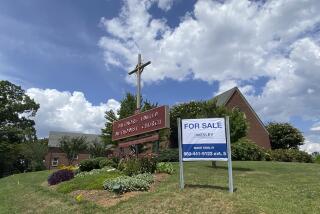Falling on Deaf Ears : Churches’ Calls for Organists Go Unanswered as Numbers Shrink
- Share via
SYRACUSE, N.Y. — The competition among churches for organists has gotten so stiff that one church here resorted to sending 240 letters to other churches looking for the names of organists who might be interested.
“We’re not trying to steal your organist,” the letters from Cicero United Methodist Church said.
But they struck out. The search continues.
Six years ago, 469 students in music colleges were majoring in organ, according to the National Assn. of Music Schools. By last year, the number had fallen to 293.
Some years, there are no organ majors at Syracuse University, which once had one of the premiere programs in the country, said Kathleen Pardee, a church organist and member of the organ faculty.
The scarcity of church organists stems from a combination of factors, Pardee said. Church music demands a high level of skill on the part of the organist, while many churches are unable to pay high salaries. Small churches often can’t afford to pay at all.
The shortage exists across the country, Pardee said. “It’s a big topic of discussion in the field.”
Many churches are changing their approach to music and turning away from traditional hymns to folk music and even rock bands with guitars, drums and synthesizers. Some churches have replaced live music with recorded music.
In the past, church organists often were women with children who did not work outside the home and could make time to practice and attend weekday evening choir rehearsals and church services every Sunday morning. Many volunteered their time or were paid minimal salaries by the church.
“Those women are back to work now,” Pardee said. “They don’t have the time to tie up every weekend playing at church.”
And they can’t make a living playing the organ. Pardee said it’s rare to find a job with a church that pays more than $10,000 a year, and those positions are generally for a combination organist and choir director.
Dennis Triggs, organist at DeWitt Community Church, fell in love with the organ as a child attending church.
He listened to the instrument--with its pipes, bellows, two manuals of 61 keys each and a pedal board of 30 keys--and was captivated.
“I was enthralled, the way the music shook the church. It was powerful,” he said. After watching their 7-year-old son standing in front of windows pretending the sills were keyboards, Triggs’ parents started him on piano lessons.
He got his first paid church-organist position at age 12 but has never earned a full-time living at it, he said. Most of the income he makes from playing the organ is from the 90 to 100 weddings he plays at each year.
He supplements his income selling organs to churches, he said. The organs are electronic, but pipes can be added.
“It’s the pipes that give the organ its sound,” Triggs said. But the cost of building a pipe organ can run from $250,000 to $500,000, a prohibitive amount for most churches.
As churches face the dearth of organists, they are searching for creative ways to cope.
In Syracuse, the Roman Catholic Diocese has a program to train organists, said Sister Laura Bufano, director of the Office of Liturgy.
Begun in 1971 after the Second Vatican Council, the program has hired four organ teachers. People who have keyboard skills are invited to apply for the program, which costs $300 for 14 weekly half-hour lessons.
“We have a couple of high school students learning the organ and they’re doing very well,” Bufano said. “It’s not a solution necessarily, but it’s a step.”
Pardee said the American Guild of Organists is promoting workshops to introduce children to organ music. And for the first time this fall, Pardee is offering a course on church music skills to train pianists on the organ.
“I’m hoping to send some of them to some smaller church positions,” she said.
In the meantime, some churches are trying to cope with the shortage by growing their own organists. Bethany Baptist Church in Syracuse is encouraging its young people to appreciate the music that accompanies their worship, in hopes of attracting some of them to the profession.
“We are very blessed to have three dedicated persons who play both piano and organ,” said the Rev. Donald Dewberry. “And we do have some young people being nurtured into music.”
More to Read
Sign up for Essential California
The most important California stories and recommendations in your inbox every morning.
You may occasionally receive promotional content from the Los Angeles Times.













